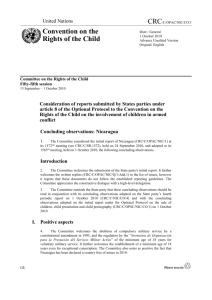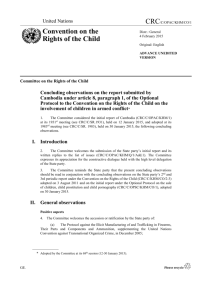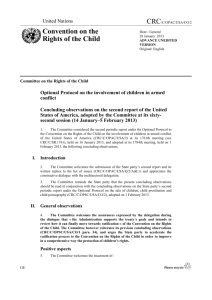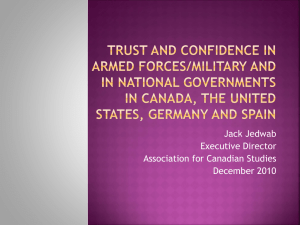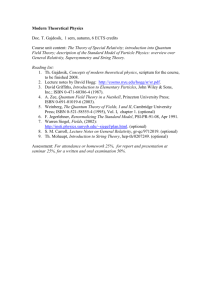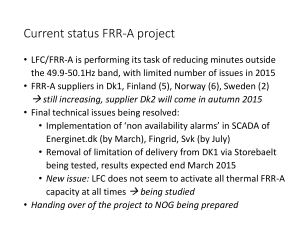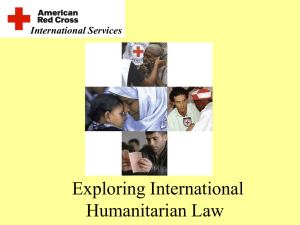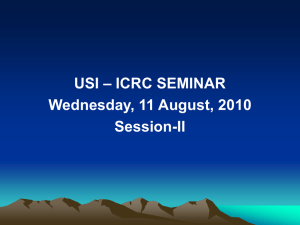Slovakia
advertisement
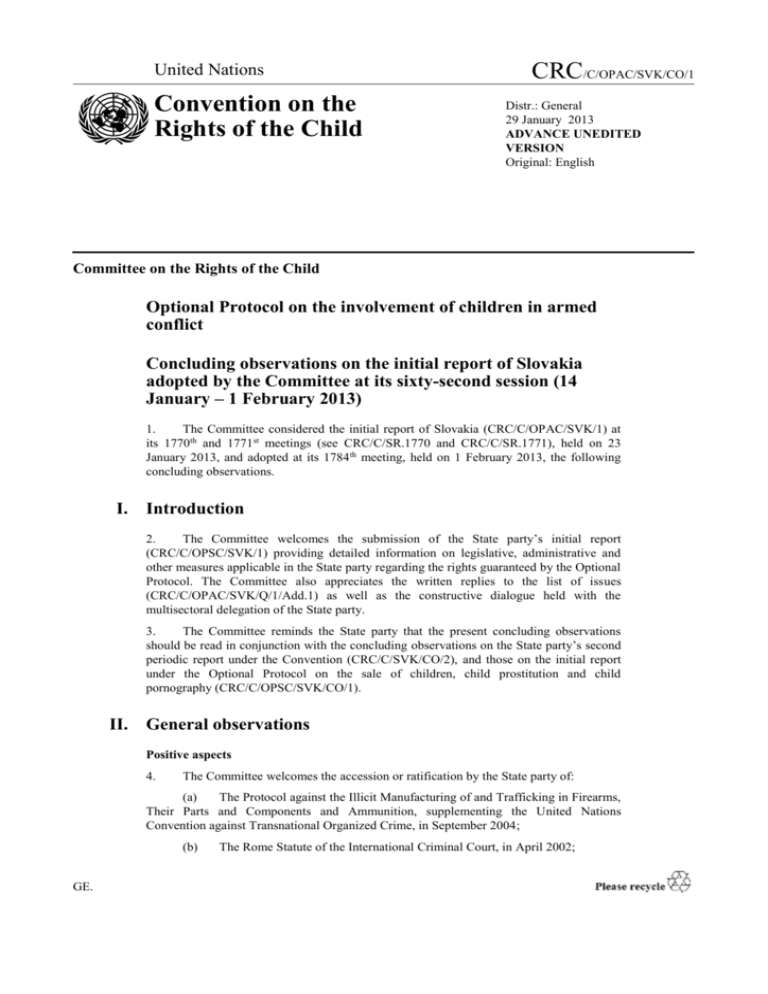
United Nations Convention on the Rights of the Child CRC/C/OPAC/SVK/CO/1 Distr.: General 29 January 2013 ADVANCE UNEDITED VERSION Original: English Committee on the Rights of the Child Optional Protocol on the involvement of children in armed conflict Concluding observations on the initial report of Slovakia adopted by the Committee at its sixty-second session (14 January – 1 February 2013) 1. The Committee considered the initial report of Slovakia (CRC/C/OPAC/SVK/1) at its 1770th and 1771st meetings (see CRC/C/SR.1770 and CRC/C/SR.1771), held on 23 January 2013, and adopted at its 1784 th meeting, held on 1 February 2013, the following concluding observations. I. Introduction 2. The Committee welcomes the submission of the State party’s initial report (CRC/C/OPSC/SVK/1) providing detailed information on legislative, administrative and other measures applicable in the State party regarding the rights guaranteed by the Optional Protocol. The Committee also appreciates the written replies to the list of issues (CRC/C/OPAC/SVK/Q/1/Add.1) as well as the constructive dialogue held with the multisectoral delegation of the State party. 3. The Committee reminds the State party that the present concluding observations should be read in conjunction with the concluding observations on the State party’s second periodic report under the Convention (CRC/C/SVK/CO/2), and those on the initial report under the Optional Protocol on the sale of children, child prostitution and child pornography (CRC/C/OPSC/SVK/CO/1). II. General observations Positive aspects 4. The Committee welcomes the accession or ratification by the State party of: (a) The Protocol against the Illicit Manufacturing of and Trafficking in Firearms, Their Parts and Components and Ammunition, supplementing the United Nations Convention against Transnational Organized Crime, in September 2004; (b) GE. The Rome Statute of the International Criminal Court, in April 2002; CRC/C/OPAC/SVK/CO/1 (c) The ILO Convention No. 182 (1999) concerning the Prohibition and Immediate Action on the Elimination of the Worst Forms of Child Labour in December 1999. 5. The Committee welcomes the various positive measures taken in areas relevant to the implementation of the Optional Protocol, in particular: (a) the State party’s declaration made upon the ratification of the Optional Protocol, that the minimum age for voluntary recruitment into the armed forces of Slovakia is 18 years; and (b) the State party contribution to the implementation of the guidelines on children and armed conflict adopted by the European Union’s General Affairs and External Relations Council in December 2003. III. General measures of implementation Dissemination 6. While noting that the text of the Optional protocol is included in the websites of the relevant government departments and in the websites of the Public Defender of Rights, the Committee is concerned about the lack of efforts by the State Party to make the principles and provisions of the Optional Protocol more widely known to the public at large and children in particular. 7. In light of article 6, paragraph 2, of the Optional Protocol, the Committee recommends that the State party ensure that the principles and provisions of the Optional Protocol are widely disseminated among the public at large and children in particular. Training 8. While welcoming the establishment of various training programmes and seminars on international humanitarian law and human rights law, including provisions of the Optional Protocol, for members of the armed forces and those serving in the United nations and NATO peace-keeping missions, the Committee is concerned about the lack of training programmes on the provisions of the Optional protocol for all relevant professionals working with and for children, in particular border and immigration personnel, social workers, and medical professionals. 9. The Committee recommends the State party to organise training programmes on the provisions of the Optional protocol for all relevant professionals working with or for children, in particular border and immigration personnel, social workers, and medical professionals. IV. Prohibition and related matters Prohibition of recruitment 10. The Committee notes as positive the exclusion, by law, of the possibility of persons under the age of 18 years old from serving in the armed force, either for compulsory or voluntary recruitment, and the fact that there can be no exceptions to the age requirement. However, the Committee regrets that recruitment or use in hostilities of children under the age of 18 years by State Armed Forces and non-State armed groups is not explicitly prohibited and criminalized by law. 2 CRC/C/OPAC/SVK/CO/1 11. The Committee recommends the State party to enact in its legislation explicit prohibition and criminalization of the recruitment or use in hostilities of children under the age of 18 in State Armed Forces and non-State armed groups. 12. The Committee notes with appreciation the support of the State party to the Montreux Document on Pertinent International Legal Obligations and Good Practices for States related to Operations of Private Military and Security Companies during Armed Conflict. Nevertheless, the Committee is concerned by the absence, in domestic legislation, of criminal liability of the private and security services or companies. 13. The Committee recommends that the State party consider enacting domestic legislation on the criminal liability of private military and security services and companies and that it provide information on the steps taken in this respect in its next periodic report. Extraterritorial Jurisdiction 14. The Committee notes information by the State Party about the possibility to establish extraterritorial jurisdiction in cases of recruitment or involvement in hostilities of a child under the age of 15 years. However, it regrets that the law does not allow extraterritorial jurisdiction for all the offences under the Optional Protocol, in particular for the recruitment or use in hostilities of children under the age of 18. 15. The Committee recommends that the State party take all necessary steps to ensure that domestic legislation enables it to establish and exercise extraterritorial jurisdiction over all offences under the Optional protocol, including the recruitment and use in hostilities of children under the age of 18. V. Protection, recovery and reintegration Measures adopted to protect the rights of child victims 16. While noting that few children among refugees and asylum seekers come from countries where armed conflicts exist and where children may have been involved in armed conflict, the Committee is concerned that the State party has not put in place a mechanism to identify at an early stage children who may have been involved in armed conflict, nor a procedure for their protection, recovery and re-integration. 17. The Committee recommends that the State party put in place mechanisms to identify at an early stage children among refugees and asylum seekers coming from countries where armed conflicts exist and who may have been involved in armed conflict in order to ensure their protection, recovery and reintegration. The Committee further recommends that the State party develop protocols and specialized services to ensure that former child soldiers are provided with appropriate assistance for their physical and psychological recovery and social reintegration. VI. International assistance and cooperation International cooperation 18. The Committee recommends that the State party continue and strengthen its cooperation with the International Committee of the Red Cross, the UNHCR and with the Special Representative of the Secretary-General for Children and Armed Conflict, and that it explore increased cooperation with relevant United Nations entities in the implementation of the Optional Protocol. 3 CRC/C/OPAC/SVK/CO/1 VII. Ratification of the Optional Protocol on a Communications Procedure 19. The Committee, while noting with appreciation the efforts done by the State party to bring the drafting process of the Optional Protocol to the Convention on the Rights of the Child on a Communications Procedure (OPIC) to a successful conclusion under its chairmanship of the working group thereon, as well as being its 1st signatory, urges the State party to ratify OPIC as soon as possible in order to further strengthen its commitment to the fulfilment of children’s rights. VIII. Follow-up and dissemination 20. The Committee recommends that the State party take all appropriate measures to ensure the full implementation of the present recommendations by, inter alia, transmitting them to the Parliament, relevant ministries, including the Ministry of Defence, the Supreme Court, and to local authorities, for appropriate consideration and further action. 21. The Committee recommends that the initial report and written replies submitted by the State party and the related concluding observations adopted by the Committee be made widely available, including (but not exclusively) through the Internet, to the public at large, civil society organizations, youth groups, professional groups and children, in order to generate debate and awareness of the Optional Protocol, its implementation and monitoring. IX. Next report 22. In accordance with article 8, paragraph 2, the Committee requests the State party to include further information on the implementation of the Optional Protocol and the present concluding observations in its next consolidated third, fourth and fifth periodic report under the Convention on the Rights of the Child due by 30 June 2013, in accordance with article 44 of the Convention. 4
